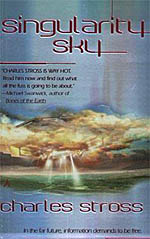
![]() Triseult
Triseult
3/24/2012
![]()
The opening of Singularity Sky is as gripping as they come: one day, on the backwater planet of Rochard's World, telephones begin raining down from the sky. Everybody who picks one up is given a simple order: Entertain us, and we will grant your wish. And just like that, money, bicycles and replicator machines begin falling from orbit, and Rochard's World falls into chaos.
Soon, the New Republic, a strict dictatorship, dispatches a fleet to deal with the enemies 'attacking' their colony. But in so doing, they put their entire civilisation at risk: for in trying to gain an advantage on the Festival, they plan on delving into time-travel, a technology sternly prohibited by the Eschaton, a transcendant AI controlling the fate of Humanity itself.
Sounds good so far, doesn't it? Unfortunately, that's pretty much the point where the whole novel grinds to a halt. It's a sad statement on Charles Stross' storytelling abilities that he would go on to tell such a boring story based on such a strong setting, but here it is: the major part of the novel gets lost in cliché spy vs. spy stories aboard a capital ship run by two-dimensional military types.
One major problem with Singularity Sky is determining whether Stross is serious or satirical throughout his novel. A lot of the happenings aboard the ship are one-sided and flat, and as far as espionnage stories go, they make James Bond look realistic. It's bad enough that Rachel Mansour, the sympathetic UN delegate, actually uses some sort of miraculous replicator luggage to do everything from staging a rescue to fabricating an escape pod. I kept having flashbacks to Rincewind's Luggage in Terry Pratchett's Discworld.
Is the novel satire, then? It might well be, and it certainly includes some part that seem to be aimed for comedic effect. The major problem with satire, though, is consistency: Stross seems to alternate between moments of satire and seriousness, and it makes any attempt at emotional connection with his main characters totally impossible. At no point do they exceed the stereotypes they are meant to represent, and the relationships that eventually grow around them are unconvincing and bland.
I understand that Stross is pretty popular with today's geek crowd, much like Cory Doctorow. Just like Doctorow, however, I find Stross entirely too rooted in modern ideals for my SF tastes. It seems that Stross built his future world not so much as an argument for his own view of the world, but as a vindication of it. It's at its most obvious when, near the end of the novel, his "good guys" engage in a totally one-sided argument with the representative of a controlling dictatorship, where the heroes treat their adversary like a child who has yet to discover that "information wants to be free," and other such truisms. Such blatant geek wish-fulfillment might please other readers, but for me, it totally steals away my ability to suspend disbelief. I love SF novels that raise thought-provoking debates (of which Orwell's Nineteen Eighty-Four is possibly the epitome); in the case of Singularity Sky, though, the whole thing is built as a one-sided monologue, and so accomplishes as much as the propaganda it so strongly decries.
Another annoying tendency of Stross is to throw away references to modern times with total disregard to credibility. It's cheap, and it feels like Stross is pandering to the crowd by sacrificing the timeless qualities of his story. For instance, when describing some sort of exotic technology, a character reflects that the thing has:
"...rather more computing power than the whole of the pre-Singularity planetary Internet."
That's well and dandy to give the readers a point of reference, but the reason most of the SF authors avoid such device is because it sounds as silly as if I went around claiming my word processor has "more writing power than 2 medieval cloisters full of monk scribes". It just doesn't make sense for future characters to refer to events and technologies that are so far in their own history.
As a whole, Singularity Sky is as chock-full of bizarre and interesting ideas as the reviews made it out to be. Unfortunately, the grand canvas of ideas that Charles Stross has created is used to paint a boring story that never provides emotional resonance. Add to it a number of annoying writing habits, and all I can say about Singularity Sky is that it totally fails to live up to its own hype.